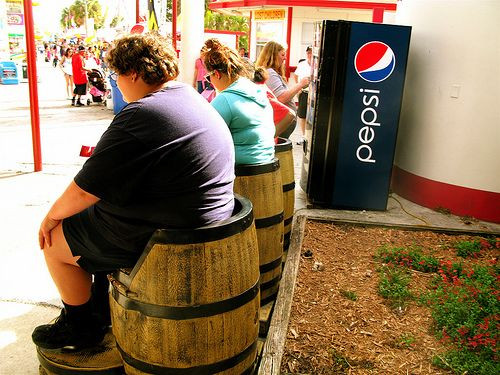Obesity In America: 94% Of Americans Blame Fat People For Being Obese, So Why Is It Still A Problem?

Despite the highly individualistic culture we Americans have developed for ourselves, we retain the uncanny knack to reflexively extend blame outward. Finger-pointing in our own direction is often hard, and discomfiting.
Now a new study suggests our personal health falls victim to this bias, as 94 percent of Americans agree people are responsible for their own weight issues, despite the fact that obesity continues to be an epidemic in this country. It raises the question: If we all agree obesity is our own fault, why do we keep getting fatter?
A Disease Of Massive Proportions
Data from the Centers for Disease Control and Prevention show that more than one in three adults are currently obese. Coupled with the American Medical Association’s recent classification of obesity as a disease, rather than a risk factor for other diseases, the current landscape for weight management in the U.S. is bleak. American waistlines continue to expand, despite overwhelming evidence that such a lifestyle is unhealthy. Thankfully, new data may illuminate why the phenomenon takes place anyway.
Researchers from the University of Illinois sought to better understand how the American public places the blame when it comes to obesity. They surveyed 800 people in a representative sample, hoping to find out, specifically, “Who is primarily to blame for the rise in obesity?" Despite the opportunity to blame the government, farmers, restaurants, parents, food manufacturers, and grocery stores, people overwhelmingly chose individuals. Ninety-four percent of people, in other words, agreed we are making ourselves fat.
This fact is sobering, and it suggests several things about how the country at large views its own obesity. One fact that stood out to researchers was the prevalence of health messages in mass media and the supposed knowledge Americans have about how to stay in shape.
"Obesity is in the news every day so it would be hard to say that people are unaware of the policy initiatives in place to reduce U.S. obesity rates," said co-researcher Brenna Ellison in a statement. Displaying calorie counts at restaurants and trying to limit the size of sugary sodas, then, may only serve to offer hollow information to consumers. The stoic American, who believes he or she knows best, seldom likes to be told what to do or what to eat, let alone what to think.
"Based on our study results, the more likely conclusion is that consumers' beliefs about who is to blame for obesity don't necessarily align with the beliefs of policy makers and public health advocates,” Ellison continued. “In the United States, we're known for being an individualistic-based society, so it's not exceptionally surprising that we would put this responsibility for obesity on ourselves.”
Something is off, though. If nine in 10 put the responsibility on ourselves, and three in 10 are obese, that means that some of the respondents are obese. And extrapolated for the entire country, huge chunks of the population are blaming themselves, essentially, for their own obesity. Arguably, this indicates either an indifference to or frustration with becoming healthy. People on the back nine of their lives, for instance, may see extending their life span as an exercise in futility, and one they easily grow tired of.
Alternatively, people may simply not have a firm knowledge base with which to begin down the road to personal health. A history of poor genetics and the powerful grip of bad habit may dissuade people from reaching their potential, ultimately instilling in them the idea that they “just can’t do it.”
Alternate Findings And A Look Forward
What especially interested the research team was the population of people who didn’t blame the individual. Farmers and people on welfare were most likely to blame the government and farm policy, indicating to Ellison and her colleague that this segment may have the closest view of how the policies are implemented, despite the common view that they would appreciate them the most. In any case, the findings further stirred the pot in the debate over how obesity needs to be managed in a country that only seems to grow unhealthier.
"Unquestionably, U.S. obesity and overweight rates are much higher than they were 20 or 30 years ago so it is not surprising that policy makers and public health officials are looking for potential solutions,” Ellison remarked. “That being said, if individuals view obesity as a personal problem, how confident can we be that these solutions will work? We need to be realistic about the solutions we're proposing and implementing, and if people are not buying into them, they may need to be re-evaluated.”
Source: Lusk JL, Ellison B. Who is to blame for the rise in obesity? Appetite. 2013.



























